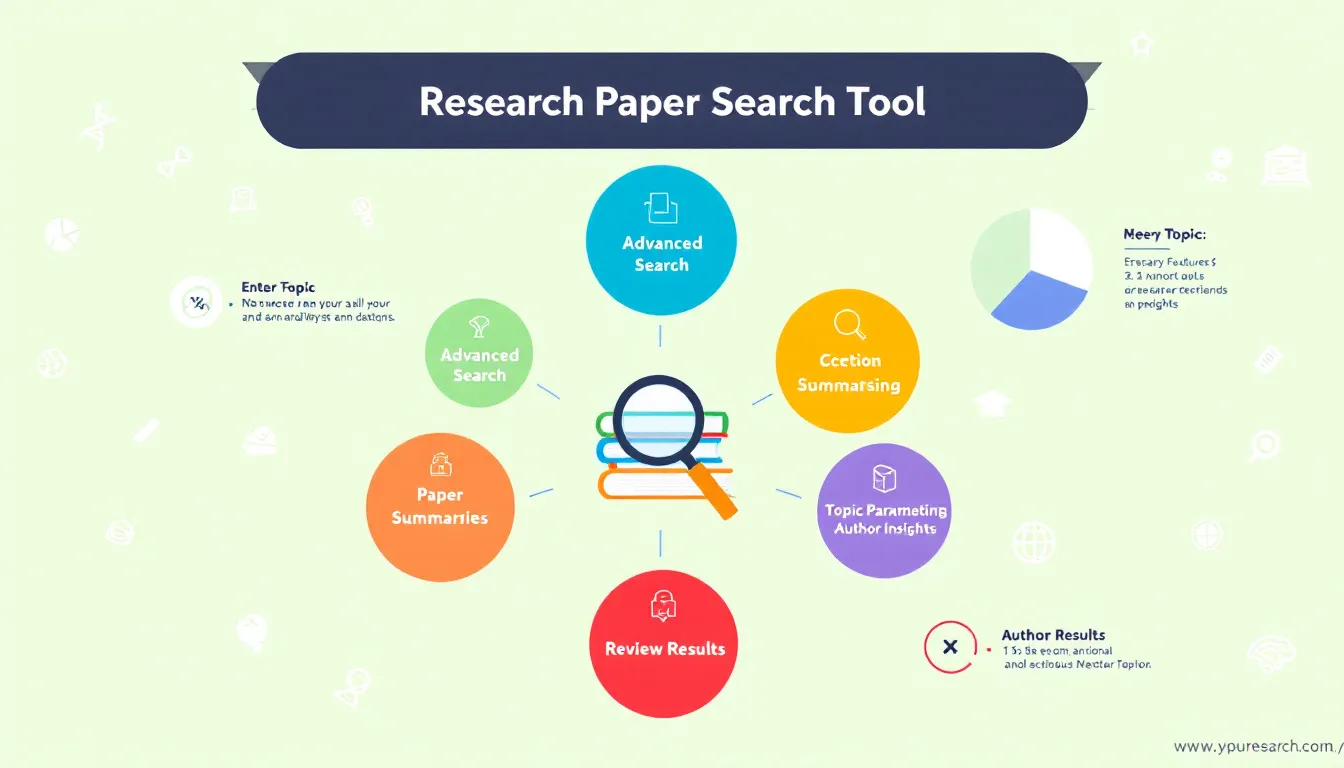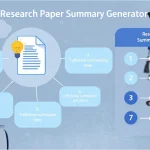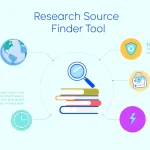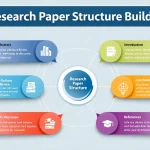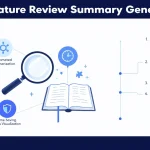Is this tool helpful?
How to Use the Research Paper Search Tool Effectively
Our Research Paper Search Tool is designed to help you quickly find relevant academic papers on your chosen topic. Here’s a step-by-step guide on how to use it effectively:
- Enter the specific topic: In the first field, type in the topic you want to research. Be as specific as possible to get the most relevant results. For example, you could enter “Machine Learning in Climate Change Prediction” or “Gene Therapy for Neurodegenerative Diseases”.
- Specify the year range (optional): If you want to focus on papers published within a certain time frame, enter the preferred year range in the second field. For instance, you might enter “2015-2023” to get papers from the last eight years.
- Set the number of papers (optional): If you want to limit the number of papers in your results, enter a number in the third field. For example, you could enter “10” to get the top ten most relevant papers.
- Click “Search Research Papers”: Once you’ve filled in the necessary information, click the blue button to start your search.
- Review the results: The tool will generate a list of research papers based on your input. Each entry will include the paper’s title, authors, publication date, abstract, and a link to access the full paper.
- Copy the results: If you want to save or share the results, you can use the “Copy to Clipboard” button to easily transfer the information.
Unlocking the Power of Academic Research: Your Gateway to Cutting-Edge Knowledge
In today’s fast-paced academic world, staying up-to-date with the latest research is crucial for students, professors, and professionals alike. Our Research Paper Search Tool is designed to be your personal academic assistant, helping you navigate the vast sea of scholarly publications with ease and precision.
This powerful tool leverages advanced algorithms to scour reputable journals, conferences, and academic institutions for the most relevant and recent papers on your chosen topic. By prioritizing publications from the last five years while also including seminal works, it ensures you have access to both cutting-edge research and foundational studies in your field of interest.
Key Features of Our Research Paper Search Tool
- Customizable search parameters: Tailor your search by specifying your topic, preferred year range, and the number of papers you want to review.
- Comprehensive results: Each search provides a wealth of information, including paper titles, authors, publication dates, abstracts, and direct links to full papers.
- Focus on credibility: Our tool prioritizes papers from reputable sources, ensuring the quality and reliability of your research materials.
- Time-saving summaries: For each paper, you’ll receive a brief summary highlighting the main findings and their relevance to your topic, saving you precious time in your literature review process.
- Proper citations: All sources are properly cited, making it easy for you to reference them in your own work.
The Benefits of Using Our Research Paper Search Tool
Incorporating our Research Paper Search Tool into your academic workflow can revolutionize the way you approach literature reviews and stay informed about your field. Here are some key benefits:
1. Time Efficiency
In the world of academia, time is a precious commodity. Our tool significantly reduces the hours you’d typically spend scouring various databases and journals. By providing a curated list of relevant papers, complete with summaries, you can quickly identify which studies are most pertinent to your research, saving you countless hours of manual searching and preliminary reading.
2. Comprehensive Coverage
Our tool casts a wide net across multiple academic sources, ensuring you don’t miss out on important studies. This comprehensive approach helps you gain a holistic view of your research topic, including different perspectives and methodologies that you might not have encountered through more limited search methods.
3. Stay Up-to-Date with Cutting-Edge Research
By prioritizing recent publications, our tool keeps you at the forefront of your field. This is crucial in rapidly evolving disciplines where new findings can quickly supersede older research. At the same time, the inclusion of seminal works ensures you don’t overlook foundational studies that have shaped your field.
4. Enhanced Quality of Research
Access to a wide range of high-quality, peer-reviewed papers improves the overall quality of your research. It allows you to build upon solid, credible sources, strengthening your arguments and conclusions. This is particularly valuable for students working on theses or dissertations, as well as researchers preparing grant proposals or journal submissions.
5. Interdisciplinary Insights
Our tool’s broad search capabilities can help you discover connections between your field and related disciplines. This cross-pollination of ideas can lead to innovative approaches and fresh perspectives in your research, potentially opening up new avenues of inquiry.
Addressing User Needs and Solving Research Challenges
Our Research Paper Search Tool is designed to address common challenges faced by academics and researchers. Let’s explore how it tackles specific problems:
Overcoming Information Overload
In the digital age, the sheer volume of published research can be overwhelming. Our tool helps you cut through the noise by providing a focused list of relevant papers. For instance, if you’re researching “Artificial Intelligence in Cybersecurity”, instead of sifting through thousands of AI and cybersecurity papers, our tool will present you with a curated list of studies specifically addressing the intersection of these fields.
Bridging Knowledge Gaps
When venturing into a new research area, it can be challenging to identify the key papers and current state of knowledge. Our tool solves this by providing a mix of recent and seminal works. For example, if you’re exploring “Quantum Computing Applications in Finance” for the first time, the tool will give you both foundational papers explaining basic concepts and recent studies showcasing cutting-edge applications.
Facilitating Interdisciplinary Research
Interdisciplinary research often requires understanding multiple fields, which can be time-consuming. Our tool simplifies this process by allowing you to search broadly and then narrow down to the most relevant intersections. For instance, a search on “Nanotechnology in Environmental Remediation” would yield papers from materials science, environmental studies, and chemistry, helping you quickly grasp the interdisciplinary nature of the topic.
Streamlining Literature Reviews
Writing a comprehensive literature review is a critical part of many academic projects. Our tool streamlines this process by providing not just paper titles, but also abstracts and summaries. This allows you to quickly assess the relevance of each paper to your review. For example, if you’re conducting a literature review on “Machine Learning in Medical Diagnosis”, our tool will provide you with a ready-made list of key papers, their main findings, and their relevance to your topic, significantly speeding up your review process.
Practical Applications and Use Cases
Our Research Paper Search Tool has a wide range of practical applications across various academic and professional scenarios. Let’s explore some specific use cases to illustrate its versatility and value:
1. Thesis and Dissertation Preparation
For graduate students embarking on their thesis or dissertation journey, our tool is an invaluable asset. Consider a Ph.D. candidate in psychology researching “The Impact of Social Media on Adolescent Mental Health”. Using our tool, they can quickly gather a comprehensive list of recent studies on this topic, including:
- Longitudinal studies tracking social media use and mental health outcomes
- Meta-analyses synthesizing findings from multiple studies
- Qualitative research exploring adolescents’ experiences with social media
- Neuroimaging studies examining brain changes associated with social media use
This broad yet focused collection of papers allows the student to build a solid foundation for their research, identify gaps in current knowledge, and position their own study within the existing literature.
2. Grant Proposal Development
Researchers preparing grant proposals can use our tool to strengthen their applications. For instance, a marine biologist proposing a study on “Microplastic Pollution in Deep Sea Ecosystems” can use the tool to:
- Demonstrate the novelty of their proposed research by showing how it builds upon existing studies
- Highlight the urgency of the issue by citing recent papers on the increasing prevalence of microplastics in marine environments
- Justify their methodology by referencing similar approaches in related studies
- Showcase their knowledge of the field by including a comprehensive literature review in their proposal
This thorough grounding in current research significantly enhances the credibility and competitiveness of the grant proposal.
3. Continuing Professional Development
Professionals in rapidly evolving fields can use our tool to stay current with the latest developments. For example, a data scientist working in the financial sector might use the tool to explore “Applications of Natural Language Processing in Financial Risk Assessment”. The search results could include:
- Papers on using NLP to analyze financial news for market prediction
- Studies on sentiment analysis of social media data for stock market trends
- Research on NLP-based models for credit risk evaluation
- Case studies of NLP implementation in major financial institutions
By regularly conducting such searches, the data scientist can stay at the forefront of their field, bringing cutting-edge techniques to their work.
4. Interdisciplinary Collaboration
Our tool is particularly useful for researchers working on interdisciplinary projects. Consider a collaborative project between computer scientists and ecologists on “AI-Driven Conservation Strategies”. The team could use the tool to:
- Find papers on machine learning applications in wildlife tracking
- Explore studies on AI-powered analysis of satellite imagery for habitat monitoring
- Discover research on predictive modeling of species distribution under climate change
- Identify papers discussing ethical considerations of AI use in conservation
This comprehensive view helps the team understand the intersection of their fields and identify promising avenues for their collaborative work.
5. Systematic Reviews and Meta-Analyses
Researchers conducting systematic reviews or meta-analyses will find our tool extremely valuable. For instance, a medical researcher working on a systematic review of “Non-Pharmacological Interventions for Chronic Pain Management” can use the tool to:
- Quickly compile a list of relevant studies across different interventions (e.g., cognitive behavioral therapy, mindfulness, acupuncture)
- Identify high-quality randomized controlled trials
- Find previous systematic reviews and meta-analyses on related topics
- Discover studies from various medical specialties (e.g., rheumatology, neurology, psychiatry) addressing chronic pain
This comprehensive search forms the backbone of a robust systematic review, ensuring that all relevant studies are included in the analysis.
Frequently Asked Questions (FAQ)
1. How recent are the papers included in the search results?
Our tool prioritizes papers published within the last five years to ensure you have access to the most current research. However, it also includes seminal works that may be older but are still highly relevant and influential in the field.
2. Can I search for papers in specific journals or from particular institutions?
While our current version doesn’t have a filter for specific journals or institutions, it does prioritize papers from reputable sources. We’re constantly working on improving our tool, and more detailed filtering options may be available in future updates.
3. How many papers can I search for at once?
You can specify the number of papers you want to include in your search results. If you don’t specify a number, the tool will return a comprehensive list of relevant papers, which you can then review and filter as needed.
4. Can I save my search results for later use?
Yes, you can easily save your search results by using the “Copy to Clipboard” button. This allows you to paste the results into a document or spreadsheet for future reference.
5. How often is the database updated with new papers?
Our database is continuously updated to include the latest published research. This ensures that you always have access to the most recent studies in your field of interest.
6. Can I use this tool for multiple research topics?
Absolutely! You can use our Research Paper Search Tool for as many different topics as you need. It’s designed to be versatile and can handle searches across various academic disciplines.
7. Is the tool suitable for undergraduate students?
Yes, our tool is beneficial for students at all levels, including undergraduates. It can help you find relevant sources for essays, research projects, and literature reviews, saving time and ensuring you’re using credible academic sources.
8. Can I use the papers found through this tool in my own work?
Yes, you can cite and reference the papers you find through our tool in your own academic work. Always make sure to properly cite your sources according to your institution’s preferred citation style.
9. How does the tool determine the relevance of papers to my search topic?
Our tool uses advanced algorithms to analyze the title, abstract, and keywords of papers to determine their relevance to your search topic. It considers factors such as the frequency and context of key terms, as well as the paper’s citation count and publication date.
10. Can I search for papers in languages other than English?
Currently, our tool primarily focuses on English-language publications. However, it may include some papers with English abstracts that are written in other languages. We’re exploring options to expand language coverage in future updates.
Important Disclaimer
The calculations, results, and content provided by our tools are not guaranteed to be accurate, complete, or reliable. Users are responsible for verifying and interpreting the results. Our content and tools may contain errors, biases, or inconsistencies. We reserve the right to save inputs and outputs from our tools for the purposes of error debugging, bias identification, and performance improvement. External companies providing AI models used in our tools may also save and process data in accordance with their own policies. By using our tools, you consent to this data collection and processing. We reserve the right to limit the usage of our tools based on current usability factors. By using our tools, you acknowledge that you have read, understood, and agreed to this disclaimer. You accept the inherent risks and limitations associated with the use of our tools and services.
